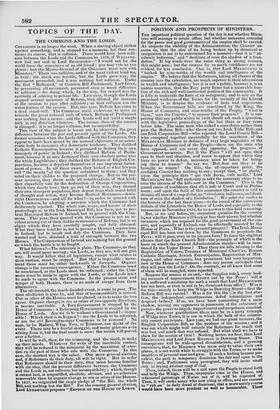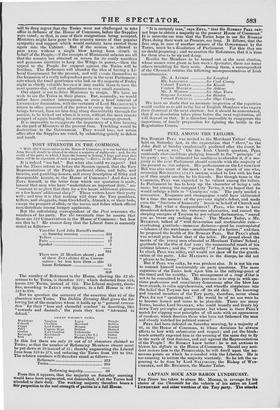POSITION AND PROSPECTS OF MINISTERS.
THE important political question of the day is not whether Minis- ters will manage to retain office, but whether measures essential for the peace and good government of the empire shall be carried. As respects the stability of the Administration, the Courier as- sures us, that the idea of its being broken up by dismissal or resignation is not to be entertained for a moment—that it is " ab- solutely ludicrous," and " destitute of even the shadow of a foun- dation." If big words were the same thing as strong reasons, this might pass; but the reasons for so much confidence are not evident, far less conclusive. One is, that Lord MELBOURNE is " backed by nine-tenths of the wealth and intelligence of the empire." We believe that the Reformers, taking all classes of the country into the calculation, are much superior to their adversaries in wealth and intelligence; but it is not a politic, because it is an untrue assertion, that the Tory party forms but a miserable frac- tion of the rich and well-instructed portion of the community. It is folly to underrate the force of an antagonist; and to rely on the presumed weakness of the Tories for the security of the Liberal Ministry, is to despise the evidence of facts and experience. When the Government bills are sanctioned by the King, the House of Commons, and nine-tenths of the People, " what is there," says the Courier, " to oppose their progress?" It is sur- prising that any public writer in 1836 should ask such a question, with the legislative proceedings of the last three or four years before him. The same men who risked a convulsion rather than pass the Reform Bill—who threw out two Irish Tithe Bills and one Irish Corporation Bill—who rejected the Local Courts Bill— who conspired together successfully for the overthrow of the MELBOURNE Ministry in defiance of very large majorities of the House of Commons and of the People—these are the men who have opposed, and are every day opposing, the progress of Government measures. But if the Peers " will not open their eyes to their real situation, and cease to oppose that which they have no power to defeat, measures must be taken for bring- ing them to reason." So say we. But how are they to be brought to reason? On this, the all-important point, the confident Courier has nothing to say; except that, "no doubt," upon the principle that " qui vult finern, vult media," Lord MELBOURNE has "full authority to take the necessary steps to in- sure the success of the bills now in the Commons." This is the grand cause of confidence that all is safe at Court and in Parlia- ment; and upon the faith of this assurance the country is told to dismiss all idea of a coup cf Rat, as "absolutely ludicrous, and desti- tute of even the shadow of a foundation." We refer the reader to the history of the last three years—to the record of the successive
defeats of the Liberals in the House of Lords, and especially to the transaction in November 1834, for an answer to this bald reasoning. But, as we said before, the important question for the country is, not whether Ministers will keep or lose their places, but whether measures which are required for the good government of the em- pire, and especially of Ireland, can be effectually resisted by the House of Peers. What is the present prospect? The Irish Muni- cipal Bill has been cut down by the Commons to propitiate the Peers : will it pass, even in its present form? Is there the slightest chance that the Irish Church Bill—the principle of which is the basis on which the present Administration stands—will be sanc- tioned by the Upper House ? Then there are bills relating to the Registration of Voters, Trustees of Municipal Charities, Roman Catholic Marriages, Jewish Emancipation, Registration of Mar- riages, and other measures, less prominent but very important, now in the House of Commons : does any person anticipate that they will pass the Lords ? On the contrary, we all know that some of them will be mangled, more rejected.
Suppose the session at an end,—the Supplies voted, every lead- ing measure of improvement thrown out by the Peers : will it be a sufficient consolation for such a result that Lord MELBOURNE has not been, or even is not to be, dismissed from office ? Was it for this—inerely to keep the Whigs in Downing Street—that the Reform Bill was carried ? Was it for this tha the last elec- tion, the independent constituencies defied intimidation and despised bribes ? If so, we have- been contending for a mere shadow, leaving our opponents in possession of the substance. of power—the power to impede improvement and perpetuate mischief. Now, whatever gratification there may be in a party triumph of Whigs over Tories, it is one in which the bulk of the commu- nity cannot participate. Last year, we had one great measure, the English Corporation Bill, as the produce of the session; and it was one which might well console the Reformers for much that was lost and much that was refused. But what shall we have to show for the session of 1836? Nothing better, we fear, than Lord MELBOURNE and Lord JOHN RUSSELL in Downing Street. The consequence will be wide-spread dissatisfaction, and a growing conviction, that, for Ministers who seem only to value their own places, it is not worth while to struggle with the Tories, or to make sacrifices of personal ease and gain. If such a feeling become pre- velem, the path to temporary dominion lies fair and open to the Tories ; and, Parliament once prorogued, they will incur small risk in trying another coup d' aut. Then, indeed, there will be a call upon the People to stand forth and help the Whigs. Then, unpopular votes in the House, and infatuated patronage of Tories out of it, will be repented of. Then, it will strike many who now cling to office, and are content to "rub on" in daily dread of dismissal, that a more manly course would have been more prudent as well as honourable. There
will be deep regret that the Tories were not challenged to take office in defiance of' the House of Commons, before the Supplies were voted; so that, in case of their resignations being accepted, Ministers might have gone to the country secure of that popular sympathy and support which would certainly have carried them again into the Cabinet. But if the session is allowed to pass away without a single blow having been struck in behalf of the People,—if the receipts of Ministerial salaries are all that the country has obtained in return for its costly sacrifices and generous exertions to keep the Whigs in power,—then the appeal to the People for support against the Tories will be fruitless. The Reformers will abandon the idea of having a Li- beral Government for the present, and will e.evote themselves to the formation of a really independent party in the next Parliament; into which the timid gentlemen who look on the majority of Friday night. as chiefly valuable because it may enable them to turn the next quarter-day, will gain admittance in very small numbers. Our object is not to drive Ministers to resign. We have no wish to see the Tories in their places. But, assuredly, we would rather have another interregnum, or even a brief interval of LYNDHURST domination, with the certainty of Lord MELBOURNE'S return to office possessed of the power to carry the measures he brings forward, than see him drag along discreditably through the session, to be kicked out when it is over, withotit the most remote prospect of again bearding his antagonists on 'vantage-ground. It is impossible to exaggerate the importance of a firm bearing on the part of Ministers at the present time. Truckling would be destruction to the Government. They would lose, not retain office after the Supplies are voted, by submitting quietly to defeat and insult.



























 Previous page
Previous page